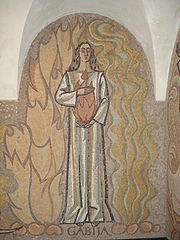
Gabija
Encyclopedia

Goddess
A goddess is a female deity. In some cultures goddesses are associated with Earth, motherhood, love, and the household. In other cultures, goddesses also rule over war, death, and destruction as well as healing....
of fire
Fire
Fire is the rapid oxidation of a material in the chemical process of combustion, releasing heat, light, and various reaction products. Slower oxidative processes like rusting or digestion are not included by this definition....
and hearth
Hearth
In common historic and modern usage, a hearth is a brick- or stone-lined fireplace or oven often used for cooking and/or heating. For centuries, the hearth was considered an integral part of a home, often its central or most important feature...
in the Lithuanian mythology
Lithuanian mythology
Lithuanian mythology is an example of Baltic mythology, developed by Lithuanians throughout the centuries.-History of scholarship:Surviving information about Baltic paganism in general is very sketchy and incomplete. As with most ancient Indo-European cultures Lithuanian mythology is an example of...
. She is the protector of home and family, provider of happiness and fertility. Her name is derived from gaubti (to cover, to protect) or from St. Agatha
Agatha of Sicily
Saint Agatha of Sicily is a Christian saint. Her memorial is on 5 February. Agatha was born at Catania, Sicily, and she was martyred in approximately 251...
(Russian: Gafiya). Gabija is only mentioned in a list of Lithuanian gods by Jan Łasicki
Jan Łasicki
Jan Łasicki was a Polish historian and theologian. He was well-educated and traveled extensively in Western Europe from 1556 to 1581. Around 1557 he converted Calvinism, becoming a follower of the Unity of the Brethren after 1567....
(published in 1615) and later encountered in Lithuanian folklore
Folklore
Folklore consists of legends, music, oral history, proverbs, jokes, popular beliefs, fairy tales and customs that are the traditions of a culture, subculture, or group. It is also the set of practices through which those expressive genres are shared. The study of folklore is sometimes called...
.
Gabija could take zoomorphic forms of a cat, stork or rooster, or she could appear as a woman clothed in red. The fire of Gabija was greatly respected and cared for like a living creature. People would feed Gabija by offering bread and salt
Bread and salt
Bread and salt is a Slavic welcome greeting ceremony.The tradition, known by its local Slavic names , was also adopted by two non-Slavic nations — Lithuanians and Romanians — both of which culturally and historically close to their Slavic neighbours .When important, respected, or admired guests...
. Fire had to be laid to bed – women would cover charcoal with ashes every evening so that fire would not wander around. Just as Gabija was the protector of the house, mother of the household was the protector of fire. Sometimes a bowl of clean water would be left near the hearth so that Gabija could wash herself. If angered, Gabija would "go for a walk" burning the house. Much folklore describes ill fate of those who offended Gabija by stomping, spitting, or urinating on fire.
Matka Gabia is the Polish
Poland
Poland , officially the Republic of Poland , is a country in Central Europe bordered by Germany to the west; the Czech Republic and Slovakia to the south; Ukraine, Belarus and Lithuania to the east; and the Baltic Sea and Kaliningrad Oblast, a Russian exclave, to the north...
goddess of home, hearth, and patron of their care. Gabia most likely originates from Gabija.

